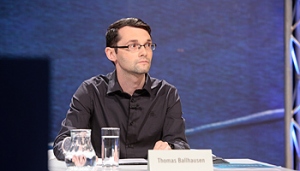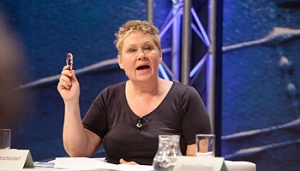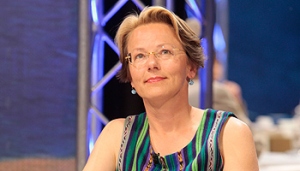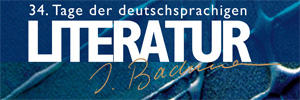 Thomas Ballhausen (Bild: Johannes Puch)
Thomas Ballhausen (Bild: Johannes Puch)
Thomas Ballhausen (A)
On Friday, Thomas Ballhausen, the first Austrian, entered the competition. His text was proposed by Karin Fleischanderl. The jury could not agree whether “Cave Canem” is a mysterious text or entirely without mystery.
“Nothing to decipher about myself”
“There are days when there is nothing to decipher even about myself”, says the protagonist of “Cave Canem” at the very beginning. What does remain to be deciphered by him is a world “that has chafed him”, his own life in a metropolis after our time, synchronicities and love possibilities, that find their mirror image in a tarot game.
Author portrait
Reading
Discussion
“Unmysterious post-apocalyptic time”
Huber Winkels, who was the first to take the floor, said that although the text attempts to be “mysterious”, in truth it is “entirely transparent”. The real and the symbolic are blended in the poetic in the search of man’s original language. As with Elmiger’s text, this, too, is a post-apocalyptic time, but here it is “entirely without mystery”.
 Thomas Ballhausen (Bild: Johannes Puch)
Thomas Ballhausen (Bild: Johannes Puch)
Fleischanderl: “I absolutely loved it”
“We are dealing with a world here that is conveyed by the media”, said Karin Fleischanderl, defending the text. She “absolutely loved” the text with its changing levels: “You never know where you are. I admire the text’s mystery. For me, it’s not so easy to decipher.”
 Karin Fleischanderl (Bild: Johannes Puch)
Karin Fleischanderl (Bild: Johannes Puch)
“Text harbours some secrets”
“For me, too, the text preserves some secrets”, said Alain Claude Sulzer, who had a favourable attitude towards the text and was on Karin Fleischanderl’s side. “The text drives me on.” He liked reading this story of an “introspective world”, which could be set in Roman times.
Sulzer felt reminded of Schnitzler’s “Traumnovelle” and Stanley Kubrick’s “Eyes Wide Shut”, partly because of the sex scene. However, he also thought that the text stays in the “approximate”. “Like under a glass cover, an aquarium” was Sulzer’s final verdict.
“Text without a thick orientation rope”
“There is no thick orientation rope in this text that one could follow – you have to go with the narrator and enter a fantastic world where evidently the game principle operates”; these were Hildegard Elisabeth Keller’s attempts to convey her impressions.
“This is an educated author”, evident from the citations woven into the text (Eco, Freud, Nietzsche), without it being “over the top”. “Strange”, she thought, was the “world of late antiquity”, and the erotic scene in the second part was very surprising because the first part was “rather anaemic”.
 Hildegard Keller (Bild: Johannes Puch)
Hildegard Keller (Bild: Johannes Puch)
Keller with reference to the title: “Has anyone understood why the dog should be feared?”
“Images merely generate emptiness”
“The text elaborately creates images that merely generate emptiness”, was Paul Jandl’s criticism. He didn’t find anything positive about the text. It’s “just simply obscurity”, said the juror and cited a few passages to lend emphasis to his argument. “The text fails because of its language. It gives the appearance of being mysterious because the language is so completely unclear.” It is “absurd to pretend” that the author is “master of his images”, according to Jandl.
Fleischanderl defends her author
Karin Fleischanderl tried to appease her colleagues. The impression of the glass cover is generated by the attempt to portray the world as conveyed by the media. The language is of a high quality because the chosen citations only become “effective as part of the whole” and do not stand out.
Spinnen: “Gesäß [bottom] really doesn’t work”
Burkhard Spinnen tried to “broach a few things”, when he said: “To me, this conveying of the world through the media that you talk about is not visible. This is the re-archaising of someone who researches. And what’s more: “Sex scenes are always the acid test”, said Spinnen, and many in the audience laughed. But for him, everything ended with the word “Gesäß” [bottom]: “This really doesn’t work.”
 TDDl 2010
TDDl 2010